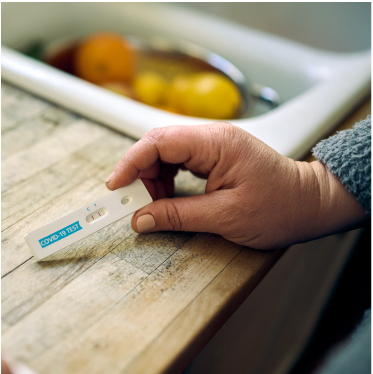Important topics to cover with a healthcare professional
Talk to a healthcare professional about all the patient's medical conditions and review recent medical records together
This will help a healthcare professional determine if PAXLOVID is an option, if a different dose is needed, or if they need to stop or change the dose of any other medicines being taken.
Help prepare for this discussion by knowing if the patient:
-
Is allergic to nirmatrelvir, ritonavir, or any of the other ingredients in PAXLOVID
-
Has liver or kidney problems, including hepatitis (bring the patient's latest lab results, if possible)
-
Has Human Immunodeficiency Virus 1 (HIV-1) infection. PAXLOVID may lead to some HIV-1 medicines not working as well in the future
-
Is pregnant or plans to become pregnant. It is not known if PAXLOVID can harm your unborn baby. Tell your healthcare provider right away if you are or if you become pregnant
-
Is breastfeeding or plans to breastfeed. PAXLOVID can pass into your breast milk. Talk to your healthcare provider about the best way to feed your baby during treatment with PAXLOVID
-
Is taking a hormonal birth control medicine. PAXLOVID can affect how some birth controls work, so be sure to ask a healthcare professional if the patient needs to use a different or an additional form of contraception
It is very important to have a list of all the medicines that the patient is taking, including over-the-counter and prescription medicines, vitamins, and herbal supplements
-
A healthcare professional can advise if it's safe for the patient to take PAXLOVID with other medicines
-
You or the patient can ask a healthcare professional or pharmacist for a list of medicines that interact with PAXLOVID
-
The patient should not start taking a new medicine without telling a healthcare professional
Some medications cannot be taken with PAXLOVID
-
Taking certain medicines with PAXLOVID can cause severe or life-threatening side effects or death
-
It is very important to tell a healthcare professional about all the medicines the patient is taking because additional laboratory tests or changes in the dose of the other medicines may be necessary during treatment with PAXLOVID
-
A healthcare professional may also tell you about specific symptoms to watch out for that may indicate that the patient needs to stop or decrease the dose of some of the other medicines
-
The table below is not a complete list of all medicines that cannot be taken with PAXLOVID. PAXLOVID may increase or decrease the levels of other medicines
Medicine name |
Common brand name(s) |
Common conditions treated* |
|---|---|---|
|
alfuzosin |
Uroxatral® |
Enlarged prostate |
|
amiodarone |
Pacerone®, Cordarone® |
Irregular heartbeat (arrhythmia) |
|
apalutamide |
Erleada® |
Prostate cancer |
|
carbamazepine |
Tegretol XR®, Tegretol®, Carbatrol® |
Epilepsy/seizures, nerve pain, bipolar disorder |
|
colchicine |
Mitigare®, Colcrys® |
Gout attacks |
|
dihydroergotamine |
Migraine and cluster headaches |
|
|
dronedarone |
Multaq® |
Irregular heartbeat (arrhythmia) |
|
eletriptan |
Relpax® |
Migraine |
|
enzalutamide |
Xtandi® |
Prostate cancer |
|
eplerenone |
Inspra® |
High blood pressure |
|
ergotamine |
Cafergot® |
Migraine |
|
finerenone |
Kerendia® |
Chronic kidney disease |
|
flecainide |
Tambocor® |
Irregular heartbeat (arrhythmia) |
|
flibanserin |
Addyi® |
Low sexual desire in females |
|
ivabradine |
Corlanor® |
Heart failure |
|
lomitapide |
Juxtapid® |
High cholesterol |
|
lovastatin |
Altoprev® |
High cholesterol |
|
lumacaftor/ivacaftor |
Orkambi® |
Cystic fibrosis |
|
lurasidone |
Latuda® |
Schizophrenia |
|
methylergonovine |
Methergine® |
Severe bleeding after childbirth or an abortion |
|
midazolam (oral) midazolam (oral) |
Versed® |
Anxiety before a medical procedure |
|
naloxegol |
Movantik® |
Constipation from prolonged treatment with opiate pain medications |
|
phenobarbital |
Luminal® |
Seizures, anxiety, withdrawal from another barbiturate medication |
|
phenytoin |
Phenytek®, Dilantin® |
Seizures |
|
pimozide |
Orap® |
Tourette syndrome |
|
primidone |
Mysoline® |
Seizures |
|
propafenone |
Rythmol SR® |
Irregular heartbeat (arrhythmia) |
|
quinidine |
Irregular heartbeat (arrhythmia) |
|
|
ranolazine |
Ranexa® |
Chronic chest pain (angina) |
|
rifampin |
Rifadin® |
Tuberculosis |
|
rifapentine |
Priftin® |
Tuberculosis |
|
St. John’s Wort |
A wide range of uses such as depression and wounds |
|
|
sildenafil |
Revatio® |
Pulmonary arterial hypertension |
|
silodosin |
Rapaflo® |
Enlarged prostate |
|
simvastatin |
Zocor®, FloLipid® |
High cholesterol and triglyceride levels |
|
tolvaptan |
Samsca® |
Low blood sodium |
|
triazolam |
Halcion® |
Insomnia (sleep disorder) |
|
ubrogepant |
Ubrelvy® |
Migraine |
|
voclosporin |
Lupkynis® |
Lupus nephritis |
*Some medicines may be taken off-label. Brand names are registered trademarks of their respective owners.

Get the most out of the conversation with a healthcare professional by being prepared. Download the Patient-Healthcare Professional Discussion Guide

Get the most out of the
conversation with a healthcare
professional by being prepared.
Download the Patient-Healthcare Professional Discussion Guide
Get the most out of your conversation with your healthcare professional by coming prepared.
Download the COVID-19 Preparedness Plan
Possible Side Effects
PAXLOVID may cause side effects, some of which may be serious, such as allergic reactions or liver problems.
The list below doesn't include all of the possible side effects of PAXLOVID. For more information, ask a healthcare professional or pharmacist.
Some side effects of PAXLOVID are:
Allergic Reactions
The patient should stop taking PAXLOVID. Call a healthcare professional right away if any of the following symptoms of an allergic reaction appear:
-
Hives, skin rash, blisters, or peeling skin
-
Painful sores or ulcers in the mouth, nose, throat, or genital area
-
Trouble swallowing or breathing
-
Swelling of the mouth, lips, tongue, or face
-
Throat tightness
-
Hoarseness of voice
Liver Problems
Tell a healthcare professional right away if any of these signs and symptoms of liver problems appear:
-
Loss of appetite
-
Yellowing of the skin and the whites of the eyes (jaundice)
-
Dark-colored urine
-
Pale-colored stools
-
Itchy skin
-
Stomach-area (abdominal) pain
Most Common Side Effects
-
Altered sense of taste (such as metallic, bitter taste)
-
Diarrhea
Other Possible Side Effects
-
Headache
-
Vomiting
-
Stomach-area (abdominal) pain
-
Nausea
-
High blood pressure
-
Feeling generally unwell
Contact a healthcare professional if any side effects become bothersome or don't go away.
Patients should always ask their doctors for medical advice about adverse events. You are encouraged to report adverse events related to Pfizer products by calling
Please see Fact Sheet for Healthcare Providers and Fact Sheet for Patients, Parents, and Caregivers.
†By clicking this link, you will be redirected to a website that is neither owned nor controlled by Pfizer. Pfizer is not responsible for the content or services of this site.

PAXLOVID
can help treat mild-to-moderate COVID-19 in patients with certain high-risk factors.
Learn who can take PAXLOVID





